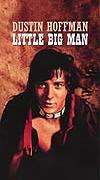Smoke Signals: A History of Native Americans in Cinema
By Ward Churchill
One can debate whether John Ford's The Searchers (1956) was really the most racist anti-Indian movie ever made, or whether that dubious distinction more rightly belongs to Robert Mulligan's The Stalking Moon (1969) or John Huston's Unforgiven (1960), but the fact is that there are a vast number of contenders. And, as Indians were systematically converted onscreen to America's equivalent of untermensch, the herrenvolk most directly responsible for perpetrating genocide against us were just as systematically heroicized, a matter which remained true from Errol Flynn's portrayal of George Armstrong Custer in They Died With Their Boots On (1941) to Robert Shaw's in Custer of the West (1969).
Being perfected was what Cherokee aesthetician Jimmie Durham terms "America's Master Narrative"—Gramsci might have called it "hegemony"—that is, indoctrination of the populace with a mythic (mis)understanding that nothing really wrong had transpired in the course of U.S, history. On the contrary, it had all been a noble undertaking, carried out by a combination of gallant leaders and brave settlers forging a better future. If anyone had gotten hurt along the way, namely Indians, it was because they'd "brought it on themselves" by being essentially subhuman in the first place and then compounding the defect with persistent and aggressive attempts to prevent whites from making things "work out for the best."
The "Good" Indians
Not all Indians were so bad, of course. Some were even depicted as being noble, too. These were the ones who perceived a "tragic inevitability" in being overrun by a self-anointedly superior race or culture, and who therefore evidenced the good taste to "simply vanish" with dignity rather than complaining about it. Even better were those who not only accepted the innateness of white supremacy, but who used their insights to provide actual service to Euroamerica, helping the invaders get on with it. Such notions are not unfamiliar to colonial literature, as even the most cursory reading of Joseph Conrad will reveal. The Lone Ranger's Tonto is, after all, simply Rudyard Kipling's Gunga Din recast in feathers, as is Chingachgook in Last of the Mohicans.
Once "revisionist" films like Little Big Man and Soldier Blue began to appear in 1970, mainly as a sop to mounting protest of the Vietnam War, previously glorified martial figures like Custer began to lose their allure. The Master Narrative was consequently reworked to admit that unconscionable atrocities had been committed against Indians over the years, just as they were being committed against Indochinese at the time. Such "historical excesses" were then attributed, however, quickly and quite uniformly, to "anomalous" Custer-like characters.
Always, these highly personalized embodiments of evil were counterbalanced by the centrality of sympathetic white characters—Candice Bergen's Christa Marybelle Lee and Peter Strauss's Honis Gant in Soldier Blue, as examples, or Dustin Hoffman's Jack Crabbe in Little Big Man—with whom Euroamerican viewers might identify. Always, the Indians in such films serve as mere plot devices intended mainly to validate the main white characters' alleged sensitivities, and to convey forgiveness to "good" (i.e., most) whites for the misdeeds of their "bad" (i.e., atypical or "deviant") peers.
For more on the subject, see Valenti: Movies Are Merely Movies and Ups and Downs of Hollywood Indians.


3 comments:
The "noble savage" is still being used in films like AVATAR and WALKER: TEXAS RANGER with Chuck Norris and his kick booty lisp, but I think the characterization of the noble savage has also time and time and again been applied to the non-native saving the natives in Dances With Wolves and Last Of The Dogmen.
The mascot issue is proof that non-natives somehow perversely feel that putting on feathers and headdresses makes them replace and "honor" the Indian as a twisted means of redemption towards somehow appeasing racial guilt(s) and even replacing native culture(s) with supremist forethought.
In other words, "since the only knowledge whites and African Americans have of Indians is from Hollywood and biased history books, it is proper and acceptable that I should honor them by helping them (Indians) save their culture."
The only problem with this is, indigenous peoples are not extinct or relics of the past.
We still have our languages and culture that predates the dominant bastard culture.
I had an exchange with a half white/Ponca guy once in Oklahoma whom tried to convince me that McDoanlds and CocaCola were "legitimate" cultures equal to native dances and songs that were over thousands of years old.
I could not believe he could even put modern American consumer products equal to native songs and dances.
Rob, you will always have critics when you write about natives. Indian people are some of the most critical and hard to please people, but at least you just write!
Indian people are for the most part, their own greatest enemy. Until we regain our respect for the lands and our own culture, how do we expect the same from the rest of the world?
Indian people are some of the most critical and hard to please people...
Hahahahaha, wow. This is probably true. The thing is, though, it means that at least we are thinkers. People who aren't critical of anything are usually not only boring but stupid.
He seems to have completely missed the point that you're not supposed to identify with the main character of The Searchers. Its simply a true to life example of how pervasive racism towards native americans was amongst the people portrayed in the film. If you identify with the character, well, that just shows you have racist leanings. Not every movie is shown from the point of view of a person you're supposed to like.
Post a Comment